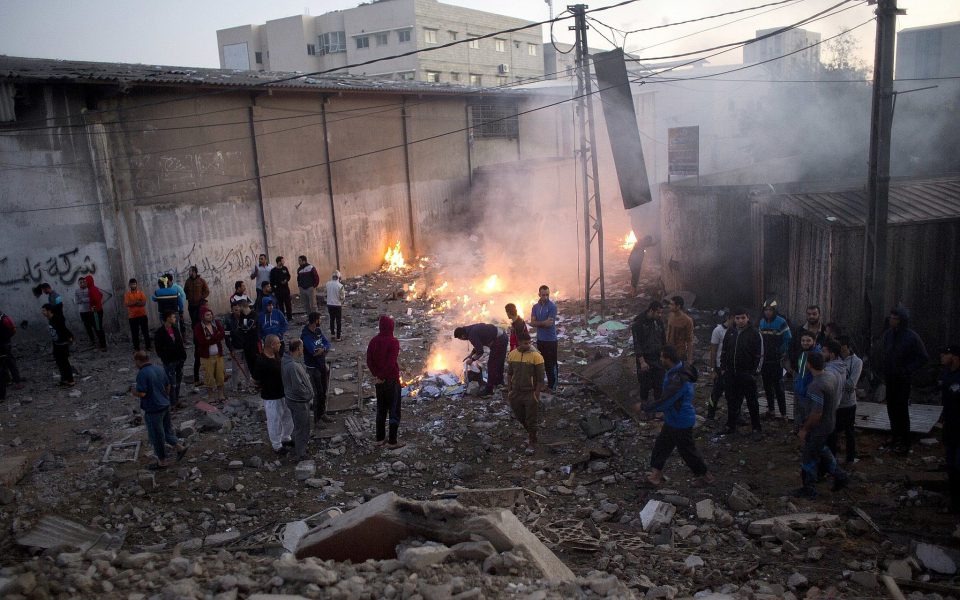Israel’s military launched airstrikes on the Gaza Strip on Monday, just a day after truce talks were held in Cairo, coinciding with a brief but intense escalation of hostilities involving Hezbollah, an Iran-backed group in Lebanon.
The ongoing Gaza conflict, sparked by Hamas’s attack on Israel on October 7, has increasingly drawn in Tehran-aligned groups across the Middle East, raising concerns about a broader regional war. In the latest escalation, Hezbollah fired rockets and drones at Israel on Sunday in retaliation for the killing of one of its top commanders. Israel responded with air raids that the military claimed prevented a larger attack.
Following the flare-up, Israel lifted the state of emergency it had declared earlier on Sunday, while Hezbollah announced that its operation was “completed.”
Diplomatic efforts have been underway for weeks to prevent a wider retaliation, particularly in response to the late July killings of senior Hezbollah commander Fuad Shukr in an Israeli strike on Beirut and Hamas political leader Ismail Haniyeh in Tehran.
Western and Arab diplomats have been emphasizing the need for a ceasefire in Gaza and a hostage release deal to ease regional tensions.
On Sunday, mediators met in Cairo but reported no significant progress in the prolonged negotiations, as fighting continued in Gaza. Witnesses and correspondents from AFP reported airstrikes and shelling in Gaza City and other parts of the territory overnight. Israel’s military stated it had targeted militants in the southern areas of Khan Yunis and Rafah, as well as near Deir al-Balah in central Gaza.
Medics reported that an airstrike on a house in Gaza City killed at least five people, with rescuers warning that more victims might be buried under the rubble in the Al-Rimal neighborhood.
“There are still martyrs and body parts under the rubble, most of them women, men, and elderly people who were sleeping when the building was hit,” said ambulance driver Hussein Muhaysen.
An Israeli military statement claimed that dozens of militants had been “eliminated” over the past day in southern Gaza. The military also reported striking a rocket launcher in Khan Yunis after Hamas fired a rocket at central Israel late Sunday.
Hamas’s attack on October 7 led to the deaths of 1,199 people, mostly civilians, according to Israeli official figures cited by AFP. In response, Israel’s military campaign has killed at least 40,405 people in Gaza, according to the territory’s health ministry, which is run by Hamas. The UN rights office notes that most of the casualties are women and children.
Of the 251 hostages taken by Palestinian militants during their attack, 105 remain in Gaza, including 34 whom the Israeli military says are dead.
Throughout the war, Hezbollah has engaged in near-daily exchanges of fire with Israeli forces, stating that its actions are in support of its ally, Hamas.
After weeks of threats, Hezbollah launched attacks on Israel early Sunday in response to Shukr’s killing. Hours after the attacks, Hezbollah leader Hassan Nasrallah stated that the group’s “main target” was an intelligence base outside Tel Aviv, located over 100 kilometers from the Lebanese border. Israel’s military reported that there were “no hits” on the Glilot intelligence complex, which Israeli media says houses the Mossad headquarters.
In retaliation, Israeli airstrikes targeted more than 270 sites in Lebanon, with 90 percent of the strikes aimed at rockets directed at northern Israel, according to the military.
Israeli Prime Minister Benjamin Netanyahu told his cabinet that these strikes were “not the final word” in the campaign against Hezbollah. Nasrallah suggested that Hezbollah’s retaliation might be complete, stating that if the outcome is satisfactory, their response “has been accomplished.”
A Hamas official confirmed that a delegation from the group met with mediators in Cairo on Sunday. It was also planned for Israeli negotiators to attend talks in Cairo.
The discussions have been based on a framework proposed by U.S. President Joe Biden in late May, with further support from Qatari and Egyptian mediators. However, a major sticking point remains Israel’s rejection of Hamas’s demand for a “complete” Israeli withdrawal from Gaza. Israel insists on retaining control over key strategic areas to prevent Hamas from rearming.
More than 10 months of conflict have devastated Gaza, destroying much of its infrastructure, overwhelming its healthcare system, and creating a severe humanitarian crisis, with warnings of famine.
On Sunday, Israeli authorities allowed a batch of polio vaccines into Gaza, as UN agencies plan a mass vaccination campaign following the confirmation of the first polio case in the region in 25 years.
Israeli evacuation orders have forced many Gazans, already displaced multiple times by the conflict, to move yet again.
“We have nowhere to go,” said Maha al-Sarsak, who was displaced from Gaza City to the south, only to be forced to leave again, ultimately seeking refuge at Al-Aqsa Martyrs hospital in Deir al-Balah.
“We came here… and now they want us to leave,” she told AFP. With the hospital evacuated, she asked, “where will we go?”

